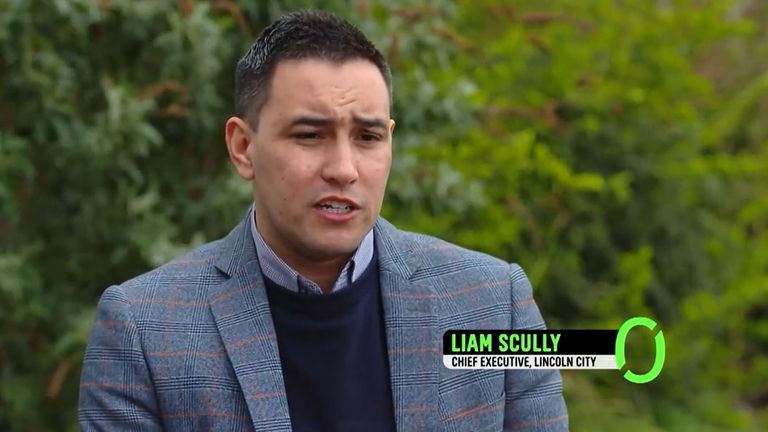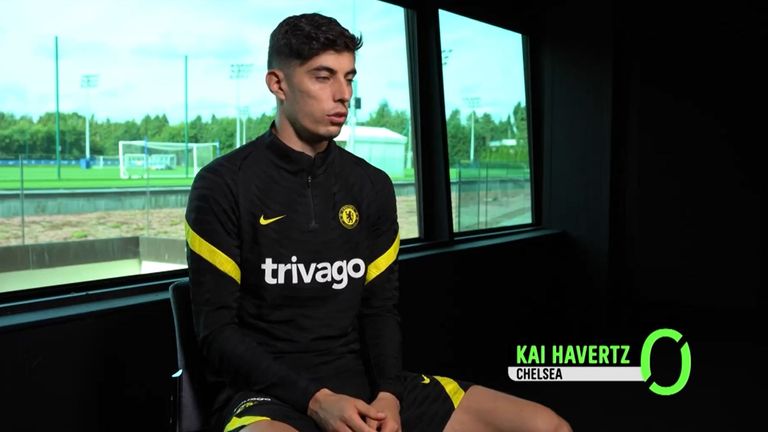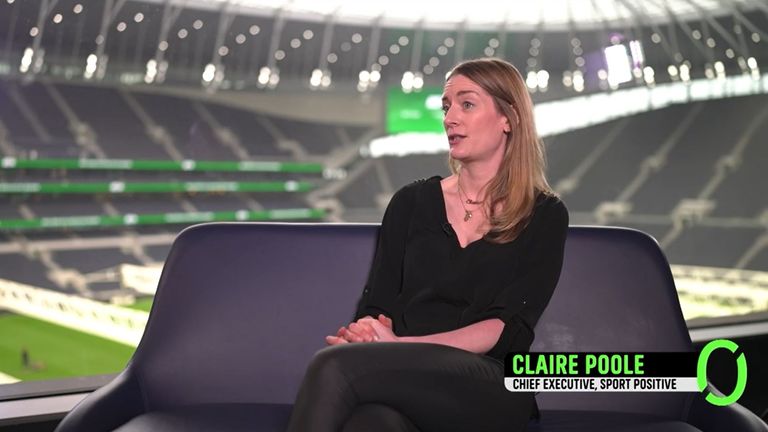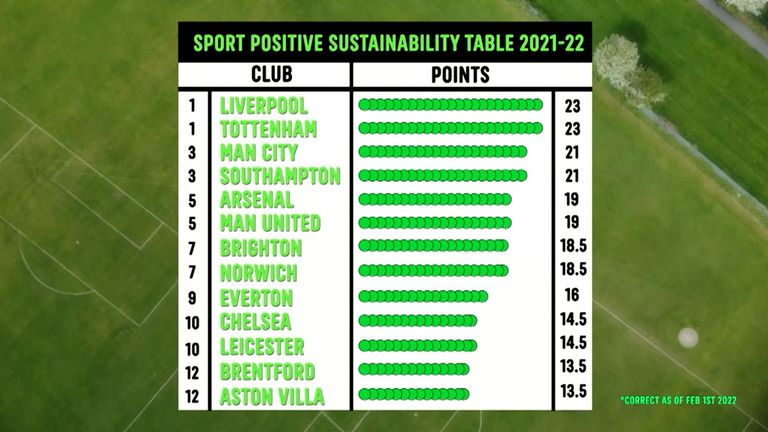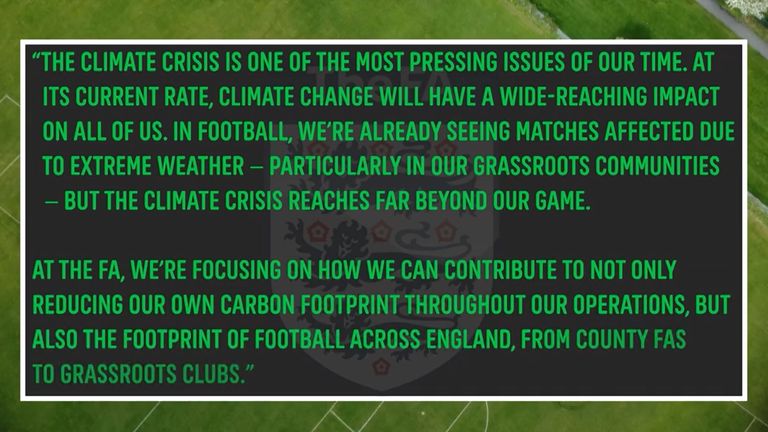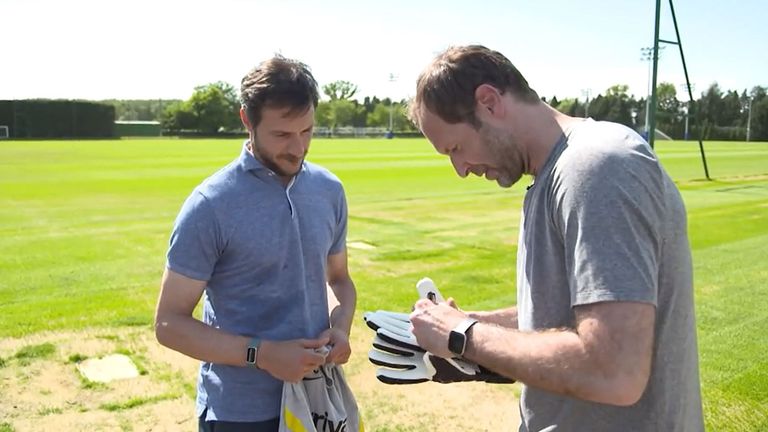Football's Toughest Opponent: Climate crisis and the fight for a more sustainable game
Around a quarter of professional stadiums in the top four leagues are under threat of annual flooding or actually being under water by 2050; Watch Football's Toughest Opponent on Sunday October 9 at 7.30pm and 9pm on Sky Sports
Sunday 9 October 2022 20:34, UK
Football has faced many challenges over the past couple of years with clubs pushed to the brink and beyond following financial difficulties.
Stadiums fell silent as a result of a global pandemic, while the threat of the European Super League almost changed the sport as we know it.
But that episode demonstrated what can be achieved when the football community comes together, and now it faces an even bigger threat on the horizon.
There can be no division when it comes to climate change.
This has been viewed as the last minute of extra time in the World Cup final. Something has to be done. Now.
Trending
- Papers: Man Utd hesitant on triggering Carreras' £25m buy-back clause
- Transfer Centre LIVE! Amorim's managerial replacement at Sporting sacked
- Hits and misses: No stopping Liverpool, Chelsea have a lot to learn
- Man Utd latest: The damning stats behind Amorim's start as head coach
- Amorim has 'no idea' how long it will take to turn Man Utd around
- Salah caps win over Leicester as Liverpool breeze to victory LIVE!
- Salah caps off Liverpool comeback win after early Leicester strike
- World Darts Championship schedule: Bunting, Price, Humphries headline Friday
- Cunha inspires Wolves to deal 10-player Man Utd third successive defeat
- Arsenal vs Ipswich Town preview: Could Phillips replace suspended Morsy?
Football's Toughest Opponent - which airs for the first time on Sunday October 9 on Sky Sports - shines a light on this crisis engulfing the game and here are a few elements that the documentary details ahead of its first screening this weekend.
The highest ever recorded temperature in the UK
Last summer was swelteringly hot with the highest-ever temperature recorded in the UK - 40.3 degrees Celsius on July 19. Drought was then declared in England just four weeks later after the driest July since 1935.
Once the temperature rises about 35 degrees Celsius, physical activity becomes problematic. Heat exhaustion and heat stroke then become real dangers at every level of the pyramid affecting players, the match officials and the crowd.
It's not the first climate extreme. In 2007, Sheffield Wednesday's ground Hillsborough was submerged after the River Don burst its banks leaving the pitch and dressing rooms flooded.
The club shop and the offices were badly damaged, while Carlisle United's Brunton Park suffered a similar fate in 2015 as a result of Storm Desmond.
The repair bill ran into the millions. The real fear is that the climate emergency will make such events longer, more frequent and more extreme.
Quarter of stadia in England's top four leagues under water by 2050
During the documentary, author and academic David Goldblatt joins Sky Sports News presenter David Garrido to underline the severity of the current situation.
"Extreme weather leads to extreme flooding," Goldblatt begins. "We're not talking about a few puddles on the pitch; we're talking about 1.5 metres of water which means no football.
"In England, this is really serious. My calculations are that around a quarter of professional stadiums in the top four leagues are under threat of annual flooding or actually being under water by 2050.
"When we talk about coastal stadiums under threat, Southampton's St Mary's is really close to the water and really low. Grimsby's Blundell Park and Scunthorpe's Glanford Park are in quite a bit of trouble."
But it is not just rising sea levels. The climate crisis affects those clubs inland, too. Extreme storms have seen Non-League Tadcaster Albion suffer devastating floods on four separate occasions since 2015.
Goldblatt fears some even bigger clubs are not immune, with Chelsea's Stamford Bridge, Fulham's Craven Cottage and the London Stadium listed as being vulnerable.
Grounds are pillars of the community
But it is further down the footballing period where stadiums are more exposed to the elements.
Protection from flooding is one of the biggest annual challenges for the likes of Lincoln City chief executive and chair of the EFL Trust Liam Scully.
"Since I've been at the football club in the past five years, we've had quite significant flooding on two occasions," Scully tells Sky Sports.
"You look from a revenue point of view at the cost of mitigation and the cost of putting things back together again.
"Football clubs are pillars of the community so when you render these facilities out of action for a period of time. Football clubs are far more than just a venue for games at 3pm on a Saturday - we would lose those non matchday activities as well."
The impact of climate change means clubs are less able to cope with the affects of heavy rain or no rain. A lack of money means they are unable to put in place the measures to mitigate for such weather extremities.
Forest Green Rovers chair Dale Vince added: "The higher up the leagues you go, the more adaptable the clubs are because they've got the cash.
"It's about energy, transport and food - how you power yourself, how you travel and what you eat. The carbon footprint of a football club is no different to a person or a business of any size."
UEFA and FIFA have a responsibility to get clubs in line. It cannot come from one person but from football's governing bodies. It has to be holistic and government-led as it is everyone's business.
€100m worth of damage suffered in Germany
It is not a crisis that is exclusively affecting clubs in the UK, but one that is clearly being felt across the planet. There were huge floods in the autumn of 2021 across Europe - specifically Belgium, the Netherlands, Germany and Austria.
The German Olympic Committee said more than €100m worth of damage was done to grassroots sports infrastructure in their country alone.
Chelsea forward Kai Havertz told Sky Sports: "After the holidays, I went to Germany and I drove through some of the streets. I saw everything was destroyed and the water was very high.
"A lot of people lost their homes, the clothes, their pets and their memories."
During the summer in Italy, conversely, more and more teams are being forced to conduct their pre-season programmes indoors owing to extreme heat. It is just the beginning, and will only get worse.
How football is fighting back
But what about recreational football? Kickabouts with your mates? Well, they're already vulnerable now.
The research that has been done suggests that one third of grassroots pitches in England are losing around six weeks a season due to flooding and inadequate drainage.
Sport Positive chief executive Claire Poole said: "At the grassroots level, how are we possibly going to have the talent coming through if people can't train on their local pitches because of the extreme weather events that we're facing?
"It is an existential threat that is perilous to the future of football."
In Birmingham, for example, 9,000-10,000 games are postponed per season at present. Air pollution is also having an effect on the quality of games that do go ahead during the warmer months.
So how is football contributing to the problem and what is being done to fight back? What plans are in motion at football's major organisations to fight the climate emergency?
Michele Uva, director of football and social responsibility at UEFA, said: "We feel we have to act. We need to use our power to win the match in this field.
"We understand that this could have an increasing impact on matches and we need to take into consideration not only the sport but also the economic impact.
"We want to engage with national associations and with clubs as they will never be alone. UEFA will support them with our structure and expertise."
The FA has described the climate crisis as 'one of the most pressing issues of our time'. The Halo Effect in Southampton have done an excellent job in the way they have taken on this challenge in reducing single-use plastics on matchdays at St Mary's and through refurbishing furniture as opposed to it going into landfill.
Old footballs have been given to schools and there are several initiatives such as these to bring the club's carbon footprint down.
The fashion industry's environmental impact
Federations, leagues and clubs are clearly taking action against climate change, but now more and more footballers and coaches are fighting back in different ways.
The fashion industry has a very significant environmental impact. It is estimated that in the UK, we buy more than two tonnes of clothing every minute.
In one month alone, the carbon footprint of buying new clothing in the UK is worse than flying a plane around the world 900 times.
So, the sheer amount of kit in football is a big issue.
Sport fashion industry is worth somewhere between 5-10 per cent of the global fashion industry. What are teams doing when they change their kit every season? Where do the old shirts go?
Union Berlin midfielder Morten Thorsby has proactively demonstrated support for environmental and/or climate change issues.
The 26-year-old founded the We Play Green Foundation in 2020 - a non-profit organisation aimed at bringing together footballers and galvanising climate action in the football industry.
The organisation has teamed up with recycling companies to collect old football kit from clubs and players to give it a second life.
Former Chelsea goalkeeper Carlo Cudicini helped set up the charity Footballers4Change, which auctions off jerseys worn by players around the world. It is not just shirts - boots are being recycled as well.
Football is starting to come together to highlight just how critical the situation is. But only a true team effort will be enough to beat football's toughest opponent.
Watch Football's Toughest Opponent on Sunday October 9 at 7.30pm and 9pm on Sky Sports.
The time to make a difference is now
We're going net zero carbon by 2030. Because the world can't wait.
To get there, we'll cut the carbon emissions created by our business, by our suppliers across the world and by the use of our tech products, by at least 50%.
We'll plant trees, mangroves and seagrass to absorb what we can't cut…yet.
And we'll spread the word through our channels and shows, inspiring as many people as we can to join us and #GoZero




